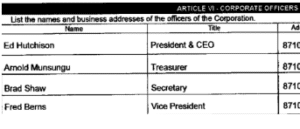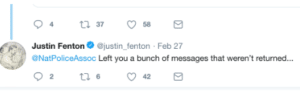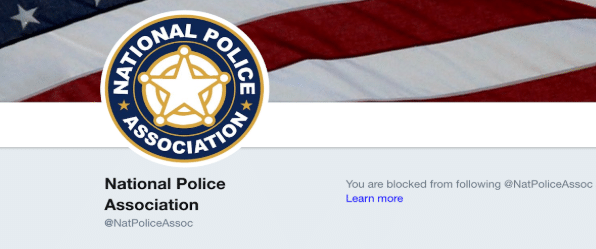In January 2019, Filter published a report about an organization called the National Police Association, which had recently filed an ethics complaint against the new Massachusetts DA Rachel Rollins, accusing her of “reckless disregard” for laws because of her policies of declining to prosecute low-level offenses, including drug dealing.
The NPA’s activities have since continued—most recently with the February 25 stunt of urging President Trump to push back against Baltimore Police Consent Decree, which was introduced in 2017 to improve police conduct and protect civil rights.
While the NPA’s Rollins complaint doesn’t hold legal water, one area of our concern was some media outlets’ acceptance of this organization as genuinely representing US law enforcement.
Filter’s investigation uncovered a nonprofit less than two years old, with no status as a union or professional organization representing law enforcement, that publishes disturbing rhetoric and surveys that amount to xenophobic propaganda. Its activities, positions and allies suggested it was part of the police identity movement.
Online searches and scrutiny of tax filings suggested that the NPA had three board members: President Ed Hutchinson, Secretary Brad Shaw and Treasurer Arnold Musungu.
Only one of them—Hutchinson—appeared to have any traceable connection with law enforcement. A search showed up an Ed Hutchinson—the wrong Ed Hutchinson, it turned out—who was previously a civilian staffer at the National Sheriffs Association.
The NPA did not at the time respond to Filter’s requests for information about the backgrounds of its board members or staffers, or indicate that we had misidentified Ed Hutchinson.
In late February, however, an investigation by journalist Justin Fenton of the Baltimore Sun—with which Filter shared its previous research—turned up even more intriguing information about the possible true identity of Ed Hutchinson and his fellow NPA directors.
The Baltimore Sun found the NPA Indiana corporate filing below, which lists a fourth board member, Vice President Fred Berns, who is not named on any other known NPA document.
 Berns, a former boxing promoter, was contacted by the Baltimore Sun. He stated “that he was not aware he was listed as the vice president and said he had not heard of the organization.”
Berns, a former boxing promoter, was contacted by the Baltimore Sun. He stated “that he was not aware he was listed as the vice president and said he had not heard of the organization.”
Berns also said that he knew Ed Hutchinson, but hadn’t spoken with him in years. “He’s always got something going like that,” Berns told the Baltimore Sun. “He’s a pretty bright kid.”
According to the article: “Berns, who worked as a Chicago police officer from 1961 until 1966, said he believes Hutchinson was a reserve officer in Indianapolis, ‘probably 20 years ago.’”
The investigation by Justin Fenton showed that the Ed Hutchinson who turned up in Filter’s search was the wrong man. Fenton told me that he contacted Lyft, the company that Ed Hutchinson worked for, and was told that he had no connection with the NPA. Filter has published an update to its previous article.
Instead, it now seems highly probable that the NPA’s Ed Hutchinson works as an investigator in the licensing division of the Indiana Attorney General’s office. The NPA did not respond to Fenton’s messages to confirm or deny this.
 Since the publication of the original Filter article, I continued to try to verify the identities of NPA’s board members—and that of Chief Financial Officer Derek Peterson—to discover what ties, if any, they have to law enforcement.
Since the publication of the original Filter article, I continued to try to verify the identities of NPA’s board members—and that of Chief Financial Officer Derek Peterson—to discover what ties, if any, they have to law enforcement.
With Fenton’s information, I was able to find an archived article from July 2015 on the State of Indiana’s website that lists an investigator, Ed Hutchinson, and Deputy Attorney General Derek Peterson, who were both thanked by then-Attorney General Greg Zoeller (2009-2017) for their work on a case.
Further online searches showed that a Derek R. Peterson is currently in private practice as an attorney in Indiana. His work history states that he was deputy attorney general for the State of Indiana from 2014-2016.
Given that Fred Berns denied that he was on the NPA’s board, and said that he was added without his knowledge, I wanted to give Peterson and the other named board members the opportunity to say that they had been misidentified, or had their names used without their consent.
I left multiple messages via Linkedin and on a phone listed for Peterson’s private practice, asking him to confirm whether or not he was the CFO of the National Police Association, quoted by the Boston Herald as calling Rollins’ policies a “risk and danger to law-abiding citizens.”
I have received no response from Peterson, and the NPA itself continues not to respond to questions that I have asked via messages to their Facebook page, an email to their website, a voicemail message to the listed phone number on the website, and requests on Twitter. The NPA did, however, block me from viewing its Twitter account on February 28.
It is ironic that the NPA refuses to answer questions about actions of its own that could be perceived as misconduct and ethics rules violations.
On March 1, I submitted a Public Records Act request to the Indiana Attorney General’s Office for emails between Derek R. Peterson and Ed Hutchinson to determine if public resources were or are being used on behalf of the NPA. At publication time, I have not received a response.
On March 17, the Indy Star published an expose on the NPA. The headline is stunning: “This Indianapolis charity says it helps police. Police chiefs say it’s a scam.” The Indy Star confirms that Derek R. Peterson is a former Deputy Attorney General of Indiana, and is also the Treasurer listed in the original Filter article, at the same time validating my belief that the NPA is a scam. According to the article:
“At least four police departments in four states have found the letters to be confusing and misleading enough to issue “scam alerts.”
The article reported one officer’s reaction to an NPA fundraising letter that could easily have been interpreted as coming from an official law enforcement source:
“I’m thinking, ‘What the hell is this, using our name and our police department to raise funds?’” Trenton Police Lt. Mike Hawkins told IndyStar. “Get out of here.”
According to the NPA’s website, it conducts investigations to uncover violations of ethics or bar association rules through the use of public records requests, in order to prove misconduct against officials it believes are anti-police. It is ironic, then, that the NPA refuses to answer questions about actions of its own that could be perceived as misconduct and ethics rules violations.
Further Areas of Potential NPA Misconduct
To take one example: The NPA was incorporated in Delaware in 2017, and then registered as a foreign corporation in Indiana. Indiana law requires that information supplied for articles of incorporation for nonprofits, articles of amendment and registration as a foreign corporation is sworn under threat of perjury prosecution.
The NPA’s president, Ed Hutchinson, signed an official State of Indiana form that allows a corporation formed outside the state to transact business there as a foreign corporation. This form lists, as vice president of the NPA, Fred Berns—who has said on record that this was untrue. Under Indiana law, adding a board member without their knowledge could likely count as perjury, a Class 6 Felony.
 Potential misuse of the bar complaint process is another problematic area for the NPA; the filing of a formal bar complaint against District Attorney Rollins is not to be taken lightly.
Potential misuse of the bar complaint process is another problematic area for the NPA; the filing of a formal bar complaint against District Attorney Rollins is not to be taken lightly.
Like an internal affairs complaint against a police officer, a state bar complaint cannot be ignored and must be investigated. In my career I have worked on unjustified IA complaints that took time and resources away from the investigation of actual misconduct.
The NPA’s bar complaint, as Law Professors Carrisa and Andrew Hessick noted in this Slate article, was “meritless.”
 As such, if Derek Peterson, as an attorney, was involved in drafting the complaint, it could be viewed as a violation of American Bar Association Ethics. These prohibit an advocate from asserting a frivolous complaint. Rule 3.1 states: “A lawyer shall not bring or defend a proceeding, or assert or controvert an issue therein, unless there is a basis in law and fact for doing so that is not frivolous.” The State of Indiana’s rules are explicitly based on the ABA rules.
As such, if Derek Peterson, as an attorney, was involved in drafting the complaint, it could be viewed as a violation of American Bar Association Ethics. These prohibit an advocate from asserting a frivolous complaint. Rule 3.1 states: “A lawyer shall not bring or defend a proceeding, or assert or controvert an issue therein, unless there is a basis in law and fact for doing so that is not frivolous.” The State of Indiana’s rules are explicitly based on the ABA rules.
I asked Rory Fleming—an attorney who provides political and policy consulting services for district attorney candidates nationwide, and who also writes for Filter—for his opinion on the ethics surrounding the Massachusetts bar complaint against DA Rollins, and the implications if an attorney helped to craft it.
“Lawyers have a duty to report, in good faith, violations of state bar rules from their fellow lawyers,” he said. “If Indiana lawyer and NPA Chief Financial Officer Derek Peterson helped pen Hutchison’s frivolous, politically motivated complaint, Peterson himself likely violated Indiana Bar Rule 3.1.”
The NPA’s decision to ignore all requests for information and with the latest article validates my initial assessment that it exists not to promote public safety, but as a political organization to push back against criminal justice reforms. The NPA at the best case scenario is manipulating the law not to work for the public interest but to benefit their own special interests.
If the NPA were a legitimate nonprofit organization, it would have no issue identifying its directors and returning inquiries from media organizations. Based on its lack of response, one can only infer that it has something to hide.
It remains incumbent on the media to understand that the “National Police Association” is not national, has no demonstrated connection with the police, and operates in ways that cast doubt on its legitimacy as an organization.
Using legal avenues or political events to serve its purposes, the NPA continues to drive the police identity movement and fuel an us-against-them mentality, further inflaming the divisions between the police and the communities they serve.
Top image via Twitter




